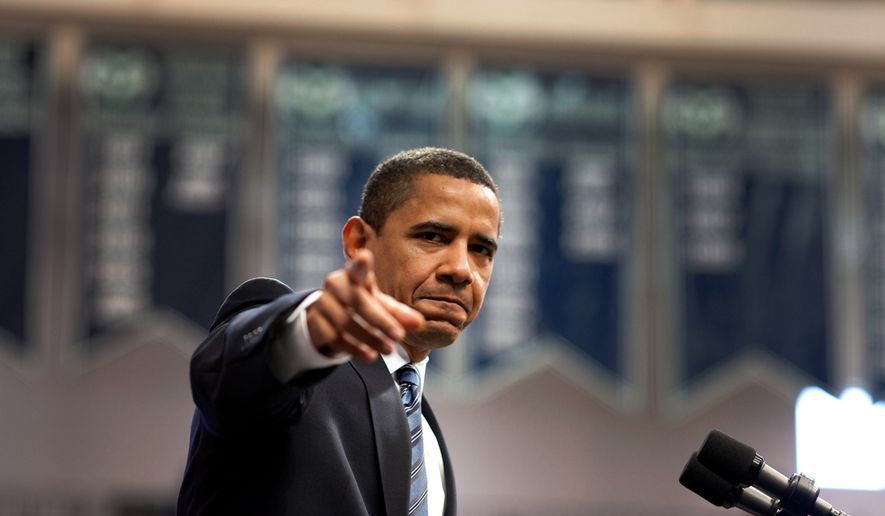President Obama this year has taken veto threats to unprecedented heights, setting a new record while vowing to block a host of GOP-backed bills that span the political spectrum.
Since the 114th Congress came to power Jan. 3, Mr. Obama has issued 26 veto threats — by far the most of any president at this point in a new legislative session. Political scientists began tracking formal veto threats in 1985.
President Bill Clinton in 1997 came closest to Mr. Obama’s pace, issuing 19 veto threats between the start of a new Congress and May 3 of that year.
Republicans have taken aim at the president’s reliance on veto threats, which usually are spelled out in official White House documents known as “statements of administration policy.” GOP leaders say Mr. Obama has proved he’s not interested in working with them on bipartisan goals and instead is intent on blocking Republicans’ agenda at every turn.
“Despite Republicans reaching across the aisle to pass good legislation, the president has responded with veto threats President Obama has shown time and again that he is unwilling to work with Congress by threatening to veto bills before they even get a chance to reach his desk,” House Majority Leader Kevin McCarthy, California Republican, wrote on his website last week. “The American people don’t want vetoes. They want Washington to work. But it can only work if the President stops his obstruction and starts cooperating with Congress.”
Over just the past week, Mr. Obama has issued four veto threats. On April 28, he vowed to veto two House appropriations bills, one to fund veterans’ programs and the other to provide money for energy programs, to safely guard the nation’s nuclear weapons and other priorities.
SEE ALSO: Bobby Jindal: GOP needs Obamacare replacement ‘today’
On April 29, he said he would veto House legislation requiring the Environmental Protection Agency to clarify its jurisdictional authority under federal law. And most recently, on April 30, he promised to block a bill to overturn the District of Columbia’s Reproductive Health Nondiscrimination Act.
Republicans say the bill would force pro-life organizations to hire pro-choice employees and may require employers to pay for abortions.
The White House took a much different view and, as is usually the case, spelled out its specific objections to the legislation in a statement of policy.
“This legislation would give employers cover to fire employees for the personal decisions they make about birth control and their reproductive health. These personal decisions should not jeopardize anyone’s job or terms of employment,” the administration said. “The act preserves the current exception in the District’s Human Rights Law for religious entities and does not impose additional requirements on employers, contrary to their personal beliefs, to provide insurance coverage related to reproductive health decisions.”
While Mr. Obama has been quick to issue veto threats, he actually has vetoed just three bills during his time in office. Most recently he vetoed legislation approving the Keystone XL oil pipeline, saying the State Department needs more time to conduct environmental studies and other reviews of the project.
Political analysts say the president’s frequent veto threats — and Republican complaints about them — usually are of little interest to average voters.
But the practice could rally Democrats in the House and the Senate. Democrats may become emboldened by the supposedly lame-duck president standing up for their positions, according to Matthew Dallek, a political science professor at George Washington University.
“It sends a signal to his party about where he stands and where his red lines are on any particular piece of legislation,” he said. “The vast majority of these veto threats go far over the heads of most voters. But occasionally there are issues that rise to prominence and narratives that get formed. If Democrats are able to paint Republican majorities as extreme or obstructionist, or both, that is to their political advantage. That can be a theme that can certainly take hold.”
The flip side, Mr. Dallek said, is that Republicans could paint Mr. Obama as the main roadblock to progress if the president frequently is seen vetoing bills the voting public supports.
“The public can also, as a broad matter, see that Obama isn’t signing much or doing much. What’s getting done in Washington?” Mr. Dallek said.
• Ben Wolfgang can be reached at bwolfgang@washingtontimes.com.




Please read our comment policy before commenting.